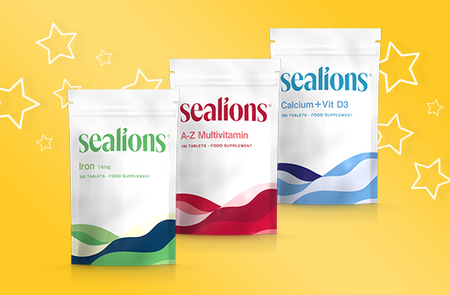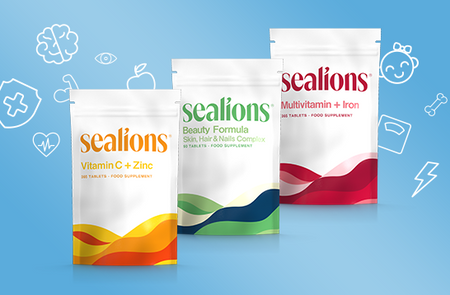
The Difference Between Magnesium and Magnesium Glycinate: Which is Best For You?
Magnesium is one mineral your body can't afford to be without. Why? Because it supports multiple processes, including stimulating energy production, maintaining bone and muscle strength, boosts the immune system and promotes heart health.
Its many benefits are obvious, but here's where things get complicated: there are numerous types of magnesium. Understanding which type is right for your needs can be challenging, especially if you're new to supplements.
One magnesium sub-type that's gaining popularity is magnesium glycinate. In this guide, we'll cover what it is, why there's a lot of buzz surrounding magnesium glycinate and whether you should add it to your daily intake.
Magnesium: What is it, and what does it do?
Magnesium plays a starring role in over 300 enzyme-driven processes, each ensuring your body functions optimally. While it's available in numerous foods, including whole grains, leafy vegetables, seeds, nuts, and legumes, many people don't get enough of it.
Research by the University of Notre Dame revealed that 75% of people don't get the recommended daily amount of magnesium, while the BBC published an article stating that males and females between 11 and 18 have surprisingly low levels of the nutrient.
What does magnesium do?
Unlike some vitamins and minerals, magnesium often remains in the background - but that doesn't mean it's not supporting vital processes. They include:
- Energy Production: Magnesium turns foods into ATP (adenosine triphosphate) an important form of energy. The mineral also activates enzymes that produce energy within the cells. So, while it doesn't play an active role, you can think of it as the stage director, ensuring actors perform their roles.
- Nervous System Regulation: Magnesium might be your new best friend if you're prone to fight or flight responses. It regulates neurotransmitters, which can create a more calm and relaxed state of mind. Different studies have positively linked magnesium with anxiety and stress reduction (Healthline).
- Muscle & Bone Function: Protein formation and synthesis are vital for muscle relaxation, repair and growth. It works hand in hand with calcium, and people with a deficiency might experience muscle cramps frequently. The risk of osteoporosis increases with magnesium deficiency (ROS).
- Heart Health: Many people don't associate magnesium with heart health, but it can balance calcium levels, which decreases the risk of high blood pressure. Some studies also suggest that magnesium can reduce cholesterol, although more conclusive research is needed (PubMed).
The types of magnesium Now that we've covered what magnesium does, it's time to look at the different types available - including magnesium glycinate. Each type offers unique benefits, and the one you choose will depend on its availability and your health requirements.
Magnesium Oxide
Magnesium oxide is one of the most popular forms of magnesium due to its affordability and availability. It has high levels of elemental magnesium but lacks bioavailability, so the body only absorbs a small percentage.
While this might seem like an issue, magnesium oxide's affordability means higher concentrations of the nutrient are still affordable. Also, many supplements combine Magnesium and Vitamin B6 for enhanced absorption.
If you don't have a severe deficiency, this form of magnesium will still offer multiple health benefits.
Magnesium Citrate
Another popular magnesium form is citrate, which has high absorption rates and is effective for people with deficiencies. It's most popular for relieving constipation and encourages the intestines to release water, softening stools.
While magnesium citrate has benefits, it's not recommended for daily use and should only be used on an ad-hoc basis.
People with IBS and other conditions that cause frequent constipation can use magnesium citrate when needed, but it's best to speak to a healthcare professional first, as high levels can cause diarrhoea.
Magnesium Chloride
Magnesium chloride is available in oral and topical form. It is often used in oils and sprays, offers excellent absorption rates, and is another popular way to relieve constipation.
If you struggle to get enough magnesium through diet alone, oral supplements can increase your intake and relieve the symptoms of heartburn.
While topical magnesium chloride can relieve muscle pain and speed up wound healing, it won't increase your levels.
Magnesium Malate
Magnesium malate is one of the lesser-known dietary supplements, but it can be beneficial for certain people. Combining magnesium with malic acid, it's sometimes used as a food additive due to its sour taste.
Easily absorbed by the digestive system, magnesium malate has a gentle effect, which is ideal for people prone to upset stomachs.
Some people use the supplement as a complementary treatment for chronic fatigue syndrome and fibromyalgia, but there's limited research into its effectiveness.
Magnesium Glycinate
Magnesium glycinate is one of the more expensive forms of magnesium, and it's less available than more popular variants. However, its main benefits include enhanced absorption and a gentle effect on the digestive system.
People with sensitive stomachs often find that magnesium glycinate doesn't cause any symptoms. It also treats anxiety and can support sleep quality, as with other forms of magnesium.
Individuals with a severe deficiency can particularly benefit from magnesium glycinate, as it's linked to the amino acid glycine.
Other forms of magnesium:
- Magnesium Carbonate: This form of magnesium salt can treat gastric issues and heartburn, but there are risks associated with taking it daily.
- Magnesium Sulphate: You've probably heard of magnesium sulphate before, as it's the chemical name for Epsom salts. Many people use it in water to relieve stress and muscle pain.
Magnesium Oxide vs. Magnesium Glycinate: Which is better?
Despite multiple forms of magnesium being available, the two most popular are magnesium oxide and magnesium glycinate. Let's take a look at each in more detail.
Magnesium Oxide
As the name suggests, magnesium oxide combines magnesium and oxygen, creating a compound with high concentrations of the mineral. While some people get enough of it through a balanced diet, others find that magnesium supplementation is necessary.
Supplements containing magnesium oxide are highly popular due to their affordability.
The benefits of magnesium oxide:
High Concentration: Magnesium oxide is known for its high magnesium concentration, which is beneficial if you want to reap the rewards this mineral offers.
- Affordability: Despite their high concentration of magnesium, supplements containing the oxide variant are incredibly affordable. This is mainly due to the availability of magnesium oxide; you can find some great deals
- Versatility: Taking a magnesium oxide supplement can relieve constipation, support digestive health, and relieve conditions like acid reflux. It also supports muscle function, improves heart health, and can regulate moods
- Lower Absorption: While magnesium oxide offers numerous benefits, it does have a low absorbance rate. People with magnesium deficiencies will need higher concentrations to reap the rewards of supplementation.
- Potential Reactions: Some people report gastric issues with high concentrations of magnesium oxide. In most cases, these reactions occur in people with IBS or other digestive-system-related conditions.
Magnesium Glycinate
Magnesium glycinate is a combination of magnesium and an amino acid called glycine, which has calming effects. It's known for its high absorbency rates and can treat a variety of conditions without causing issues for the digestive system.
While magnesium glycinate is popular, its higher cost and limited availability means that many people seek alternatives.
The benefits of magnesium glycinate:
- High Absorption: As a bioavailable compound, the body effectively absorbs and utilises magnesium glycinate.
- Digestive Benefits: Magnesium glycinate is particularly beneficial for people with sensitive stomachs or deficiencies, as it's gentle on the body.
- Versatility: As with other magnesium supplements, glycinate can treat muscle cramps, anxiety, and a range of health issues.
Potential drawbacks:
- Higher Costs: Magnesium glycinate supplements are often more expensive than magnesium oxide. They're not the best option if you want to save money.
- Availability: As a less popular form of magnesium, finding glycinate supplements is much harder.
Choosing the right magnesium supplement for your needs
When choosing between magnesium oxide and glycinate, consider your unique needs and future health goals. Next, we'll compare different health and financial goals to determine which supplement you should choose.
Are you looking for a daily supplement?
If your main focus is improving your overall health through magnesium supplementation, opting for a magnesium oxide supplement combines functionality with affordability.
When looking for supplements, we recommended finding a combination of Magnesium + Vitamin B6, as the B6 ensures your body absorbs higher levels of magnesium oxide.
Do you have a digestive condition?
If you suffer from IBS (Irritable Bowel Syndrome), IBD (Inflammatory Bowel Disease), or Celiac disease, you are at a higher risk of reacting to magnesium. If your healthcare professional recommends a supplement, they'll usually suggest magnesium glycinate, as it's gentler on the stomach.
While other forms of magnesium could cause complications, small amounts of magnesium glycinate should reduce any side effects.
What's your budget? Due to its availability, magnesium oxide is a highly affordable form of the nutrient. If you're on a budget and want to increase your magnesium levels, it will do the trick. Magnesium glycinate is more expensive, but it's not an essential cost unless you have special health concerns.
Do you have a severe magnesium deficiency?
Individuals with a severe magnesium deficiency can benefit from magnesium glycinate, as it's highly bioavailable and ensures maximum absorption. Most magnesium oxide supplements use higher concentrations to increase absorption rates, so it's still a beneficial treatment.
Key Takeaways:
- Magnesium oxide and magnesium glycinate are the two most popular forms available. Both offer multiple benefits, but the one you choose will ultimately depend on your unique needs.
- If you're looking for an affordable supplement that supports your overall health, increases your magnesium levels and fits into your daily routine, magnesium oxide is probably your best bet. You can also find multivitamins that contain it.
- Magnesium glycinate can be beneficial for people with severe deficiencies or gastric disorders. Despite its bioavailability, most people won't need to pay extra for magnesium glycinate, as oxide can support their health goals.
If you're looking for affordable magnesium supplements, Sealions has everything you need. With excellent prices and high-quality products, we ensure your health and wellbeing come first.
Tagged:







